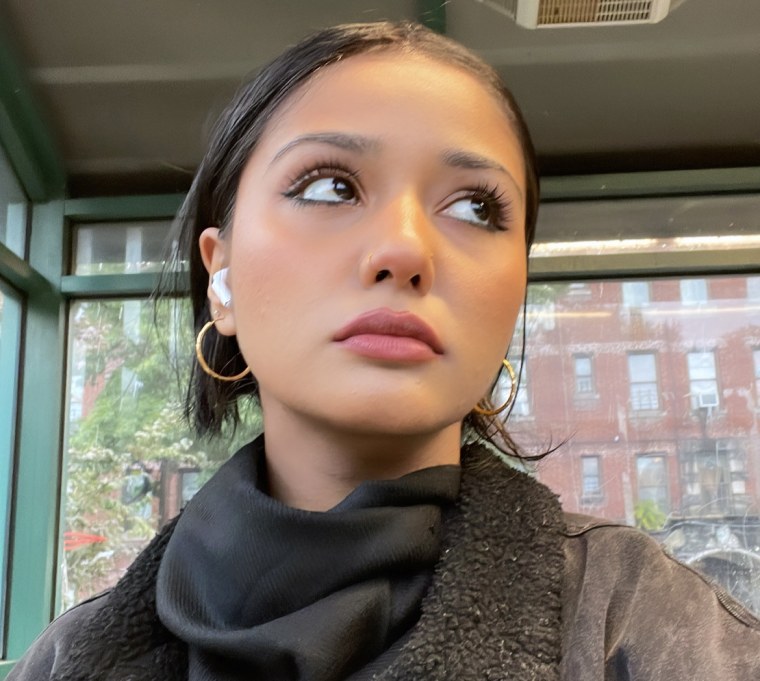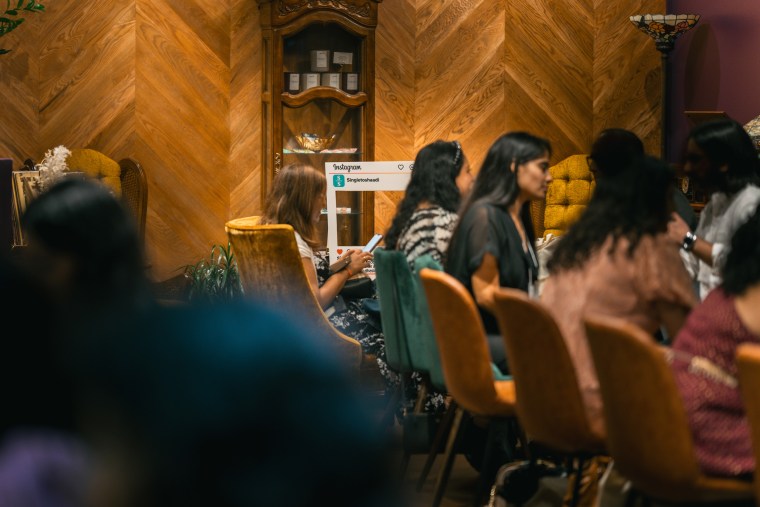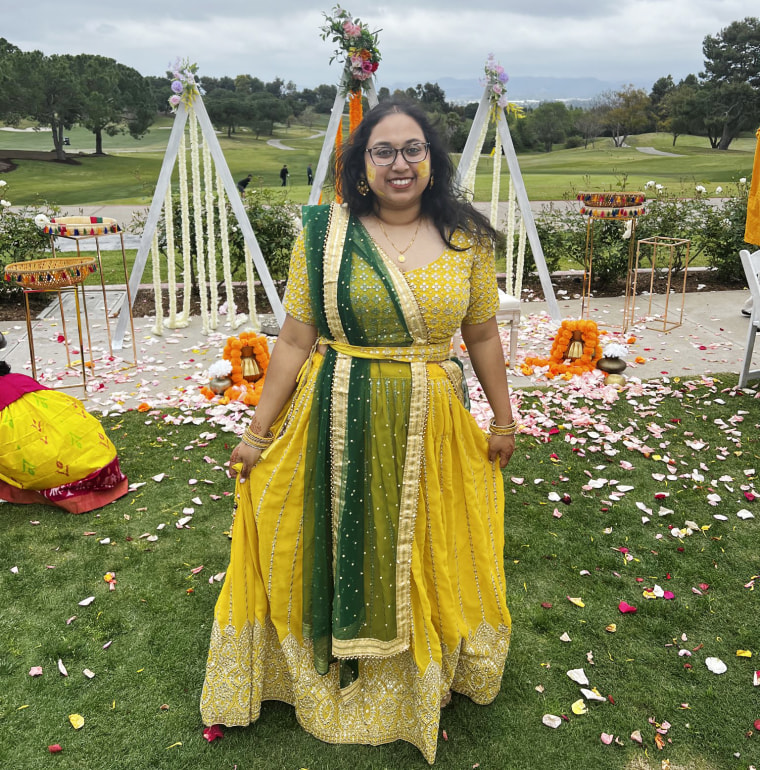
Athena Sobhan, 28, has been swiping for the better part of a decade on Tinder, Hinge, Bumble, OkCupid, Coffee Meets Bagel and even South Asian-focused dating apps like Dil Mil. But after more than five years, she feels like they’ve gotten markedly worse, and she’s ready for a different approach.
“The apps suck so bad, it’s not even funny,” said Sobhan, who is Bangladeshi American and lives in Southern California. “I’ve gotten to the point where I don’t want to play games.”
So she deleted all of them and asked her mom a question she never thought she’d utter: “Will you look for someone for me?”
As dating apps continue to be a disappointment to young people seeking love, some South Asian Americans are looking for an alternative that they once considered a relic of their parents’ generation: arranged marriage.
The modern arranged marriage
Western-driven media like Netflix’s “Indian Matchmaking” have, in recent years, sparked an exoticized interest in arranged marriages and Indian weddings. But the modern arranged marriage doesn’t necessarily look like what the media has subjected us to, said Harleen Singh, associate professor of women’s studies and South Asian literature at Brandeis University.
The process can vary from the hyper-traditional to a simple introduction.
“It doesn’t necessarily mean you’re arranged and forced to get married,” she said. “This lens of what a South Asian arranged marriage is, it’s often also a lens that is coming from the outside.”
In some religious or orthodox communities, the families make the decision and sit down together once or twice before the couple meets at the proverbial altar. But that’s not usually the case anymore, especially in the U.S. diaspora.
Many people who are opting for it say an initial introduction would be followed by months of dating and getting to know each other before any decision is made. They just want to know they’re meeting people who are serious about marriage — and they trust their parents more than an app’s algorithm.
“A dating app is only as successful as whatever programming has gone into it,” Singh said. “Whereas when families are involved, they’re really thinking not just about the two individuals, but really about a much larger community partnership that’s coming together through those two individuals.”
Joytsana Sangroula, 24, a Nepali American from New York, has also recently deleted all of her dating apps. She says she’s had good and bad experiences with them but thinks they’re ultimately less organic and serious than a connection she could form through her community.
She’s dating to marry, but she has struggled to find connections with Nepali men, something she says she’s increasingly wanting.
“My mom’s like, ‘You should be with a Nepali boy,’” she said. “Like, find me one. … It would be nice to settle down with somebody who can speak the same language as me and has the same culture as me, even if it’s not 100%.”

If her parents were to introduce her to someone, it would be more like friends setting her up on a blind date, she said, and it wouldn’t necessarily mean a full commitment to marriage.
Sana, 24, who lives in Dallas and chose to use only her first name for fear of retaliation, hopes to be married by 30. In the past, she’s met guys through Instagram, but the exhaustion of dating has landed her in the same boat as others. Valuing cultural alignment and a similar “halal-to-haram” ratio, she said, she wants to be introduced to someone by her family and date them for a year before getting engaged.
“I’ve seen people who have gotten an arranged marriage and they’re living their best lives,” she said. “I love that for them. So, if it worked for them, it could definitely also work for me.”
The real Indian Matchmaking
“Indian Matchmaking” and its massive popularity familiarized Western audiences with terms like biodata, a resumé-like document shown to potential suitors that includes a person’s photo and details about them.
It also gave people a glimpse into the superficial, demeaning standards often demanded of women looking for a husband. Hopeful mother-in-laws, for example, asked that their daughter-in-law be a certain height, weight, caste or skin color.
Some matchmakers here are trying to battle that perception.
Radha Patel, 40, is a Dallas-based matchmaker and founder of the matchmaking service Single to Shaadi. Her services don’t filter by caste, color or astrological chart. She also accepts people of all sexual orientations and gender identities.
“We really want to take all the old notions of what parents think matchmaking is in our culture and throw it out the window,” she said.
She seeks to balance the modern with the traditional — the biodatas with the happy hours. She officially started her service in 2018 because of the collective frustration she saw her peers having with dating apps. Cultural pressures to find a spouse have collided with an endless deluge of bad options in modern dating, she said.

“It’s the paradox of choice, and ‘I can just swipe’ or ‘I can just ghost,’” she said.
She clarified that she’s not a headhunter who can find someone the perfect person. Getting people matches is the easy part, she said, but the rest is up to them.
“I can get you a match every single day. The problem is what you do after that,” she said.
The biggest failure of dating apps, she said, is their inability to get people face-to-face with each other. She sees a yearning for that among some South Asians who want to find cultural familiarity without an endless amount of swiping.
The struggle with dating apps
The dating app dominators Bumble and Match Group — which houses Tinder, Match.com, OkCupid, and Hinge, among others — have lost $40 billion in market value over the last three years, according to The New York Times. Young people, like Sobhan, note that everything is behind a paywall now. Key features are disappearing unless you enter a card number, and people aren’t willing to pay for them.
“It’s very known that if you don’t pay for their services, you get some of the worst picks,” she said. “You used to be able to put your preferences, but now you can only put the basic preferences — if you want a man or woman, and if you just want a casual thing — and everything else is behind a paywall.”

A new lawsuit also claims apps like Tinder and Hinge are designed to be addictive and promote compulsive use. A Match Group representative said the lawsuit is “ridiculous and has zero merit.”
“Our business model is not based on advertising or engagement metrics,” they said. “We actively strive to get people on dates every day and off our apps. Anyone who states anything else doesn’t understand the purpose and mission of our entire industry.”
Racism and sexism are also rampant, users and experts say. Queer people of color specifically encounter “sexual racism” on apps like Grindr, and Asian women say they’re fetishized across platforms.
“Just because a space is democratized or because you’re in it doesn’t mean we’re in it equally,” Singh said.
Stigmas around arranged marriage
Sangroula says that growing up, she pictured arranged marriages as something that died with her parents’ generation — an ancient ritual where two people are just “assigned to each other” with no say. She now knows that’s not how it has to be.
“I’m still skeptical about the concept of an arranged marriage,” she said. “But as generations progress … it’s more that your parents are like, ‘Hey, like, this person is single. You should talk to them and then see where it goes.’”
With TV shows capitalizing on the intrigue, neither demonization nor fetishization is beneficial or does justice to complex South Asian communities, she said.
“Before there were dating apps, you know, you met people through other people, whether it’s your families that introduce you to each other, or it’s your friends that introduce you to each other,” Sangroula said. “The reason that it begins to be called ‘arranged’ is because we have an assumption of how South Asians go about this business called love and marriage.”




















